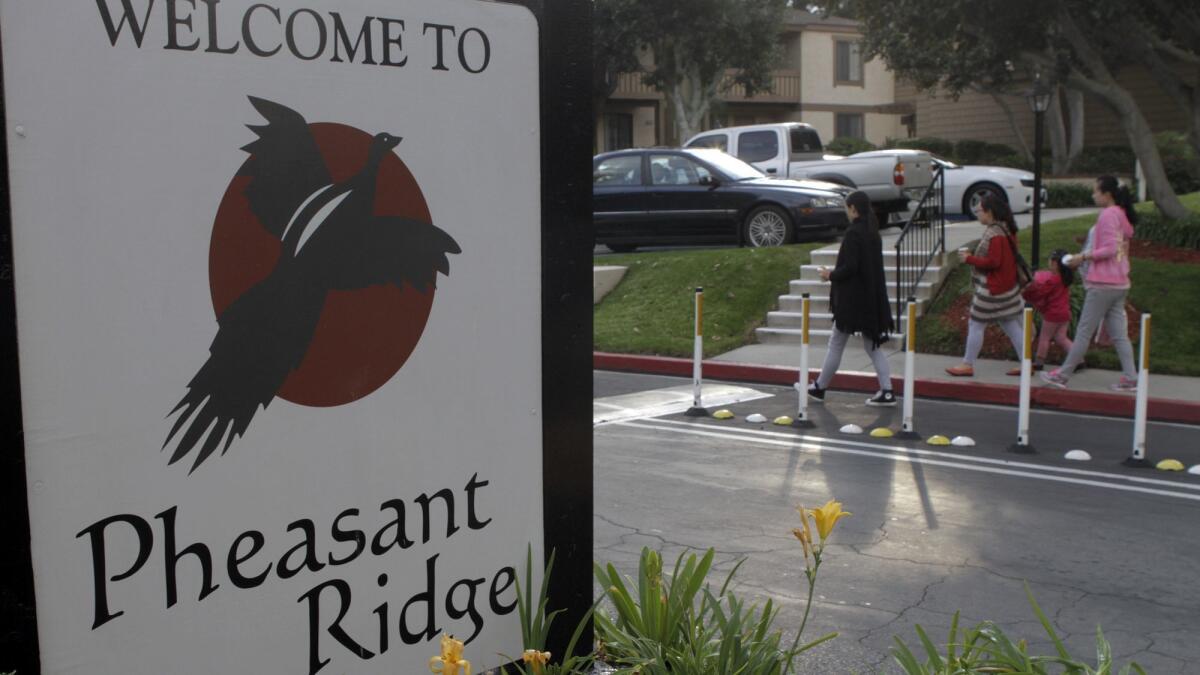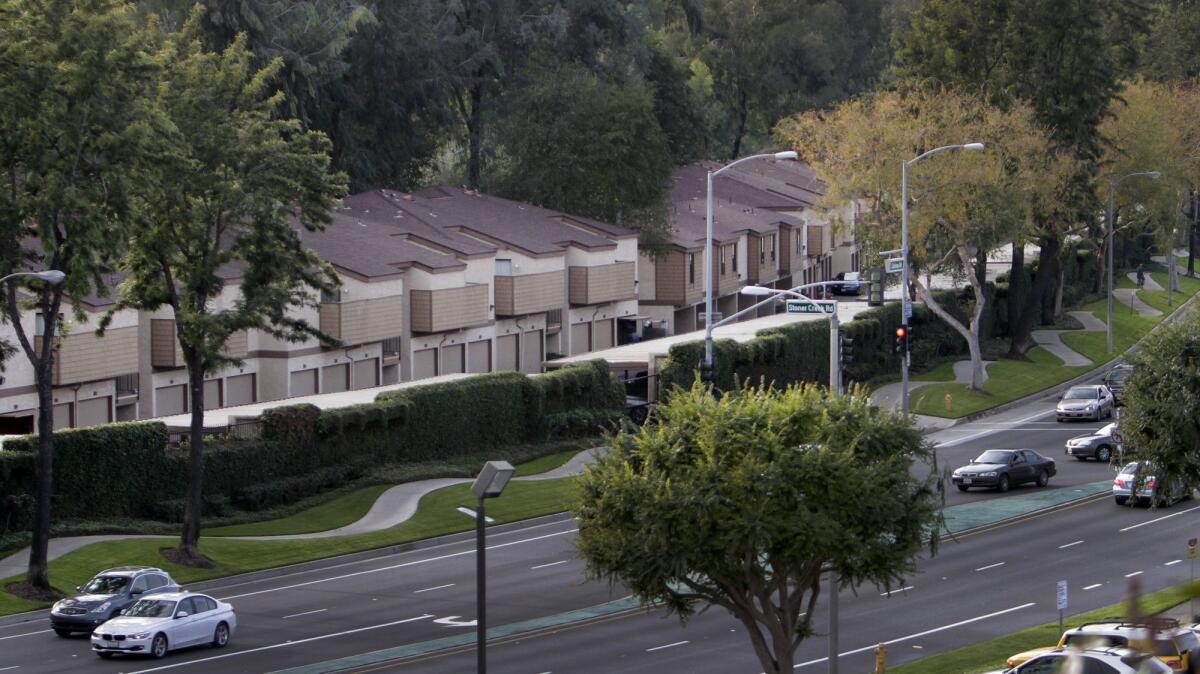From the Archives: In suburbs of L.A., a cottage industry of birth tourism

Editor’s note: This article published in The Times on Jan. 3, 2013.
USA Baby Care’s website makes no attempt to hide why the company’s clients travel to Southern California from China and Taiwan. It’s to give birth to an American baby.
“Congratulations! Arriving in the U.S. means you’ve already given your child a surefire ticket for winning the race,” the site says in Chinese. “We guarantee that each baby can obtain a U.S. passport and related documents.”
That passport is just the beginning of a journey that will lead some of the children back to the United States to take advantage of free public schools and low-interest student loans, as the website notes. The whole family may eventually get in on the act, since parents may be able to piggyback on the child’s citizenship and apply for a green card when the child turns 21.
USA Baby Care is one of scores, possibly hundreds, of companies operating so-called maternity hotels tucked away in residential neighborhoods in the San Gabriel Valley, Orange County and other Southern California suburbs. Pregnant women from Chinese-speaking countries pay as much as $20,000 to stay in the facilities during the final months of pregnancy, then spend an additional month recuperating and awaiting the new baby’s U.S. passport. Many of the hotels operate in violation of zoning laws, their locations known mainly to neighbors who observe the expectant mothers’ frequent comings and goings.
Such was the case in Chino Hills, where residents recently protested an alleged maternity hotel operating in a hilltop mansion. City officials have sued the property owner, claiming that the seven-bedroom house was illegally subdivided with 17 bedrooms and 17 bathrooms, with at least 10 mothers and babies living there. San Gabriel officials shut down a similar facility in 2011, and Chino Hills officials hope their lawsuit will result in a similar outcome.
Critics also cite safety concerns surrounding the largely unregulated industry. A local attorney says he is representing a maternity hotel in a case where a baby was dropped and died. The California Department of Public Health also is investigating a case that may involve maternity hotels, said a spokesman who said he could not provide further details.
Federal immigration authorities say no law prevents pregnant women from entering the country. The women typically travel on tourist visas and return home with their newborns, who will have the option of coming to the U.S. for schooling, sometimes while the parents remain in Asia. American citizenship is also considered a hedge against corruption and political instability in the children’s home countries. For some, giving birth in the U.S. staves off hefty fines under China’s one-child policy.
Maternity hotels have proliferated in the last decade as mainland China’s new middle class tries to give its offspring every advantage. But birth tourism is not limited to Chinese and Taiwanese nationals. South Korean and Turkish mothers are also reported to pay thousands of dollars for package deals that include hotel rooms and assistance with the visa process.
Since the publicity surrounding the Chino Hills case, Los Angeles County officials have received at least two dozen complaints, mostly regarding sites in Rowland Heights and Hacienda Heights. Curt Hagman, a Republican assemblyman from Chino Hills, said he is looking into whether state government can play a role in addressing the issue.
Because of the increased scrutiny, some maternity tourism businesses are setting up shop in standard hotels, booking long-term stays for clients, according to Scott Wang, manager of China operations for USA Baby Care. Others are opting for apartment complexes, where zoning codes are more flexible and rents are cheap enough to serve a larger number of clients.
Until a few months ago, USA Baby Care was located on a Hacienda Heights cul-de-sac, in a large two-story house with a swimming pool. Now, it operates out of a hotel in Rowland Heights.
“We really want to make this industry legal,” Wang said. “There’s a demand for these birthing centers, so we should find a way to make them legal. Not a single one of us wants to operate by sneaking around.”

The road to giving birth in the U.S. begins with an in-person interview at an American consulate in the woman’s home country. Neither pregnancy nor the intent to give birth in the U.S. are disqualifying factors. The primary concern is making sure the applicant will not remain in the country indefinitely, the State Department said.
Likewise, U.S. Customs and Border Patrol officers do not refuse entry because a woman is coming to give birth.
“Obviously, the only reason it happens at all is because we permit it,” said Mark Krikorian, executive director of the Center for Immigration Studies, which advocates reduced immigration. “They’re not doing anything illegal. The question for policymakers is, ‘Is this a good idea?’”
Maternity hotels nonetheless counsel their clients to be discreet.
Women should arrive in the U.S. about six months into their pregnancies, advises the website of a Monterey Park facility, Chico On The Child Care. For petite women who show their pregnancy more easily, four months is recommended. In the winter, when heavier clothing is the norm, the arrival timing can be extended to seven months.
It’s considered best for the women to conceal their pregnancies as much as possible, just to be safe.
“When you get on the plane, please wear appropriate clothing to get through customs,” the website says in Chinese.
Birth tourism is a lucrative outlet for hospitals and local doctors, all of whom typically take cash payments from the foreign mothers. Shopping malls and tourist attractions like Disneyland also benefit from Chinese visitors who have time to kill while waiting to give birth.
At Garfield Medical Center in Monterey Park, maternity hotel mothers blend in with Chinese and Latino immigrant patients, many of whom do not speak English and do not have health insurance. A spokesman said the hospital does not track whether patients are birth tourists, but he acknowledged that some who give birth there probably fall into that category.
“They’re here, and presumably they are presenting themselves here,” said Erik Jiang, a hospital spokesman. “We have lots of doctors and nurses who speak Chinese.”
A month’s stay at Chico, which advertises “five stand-alone villas of different styles,” ranges from about $2,500 to $4,200 for a pregnant woman, and as much as $6,300 after giving birth. The average stay at Chico can easily top $15,000, not including medical bills.
Even so, a few months in a maternity hotel is a bargain compared with other means of obtaining U.S. citizenship, such as the EB-5 visa, which requires an immigrant to invest in an American business.
“When you compare it to investor immigrants who need $500,000 to $1 million, this is pretty cheap,” says USA Baby Care’s site.
As the maternity hotel business boomed in the last few years, Rosemead attorney Daniel Deng began receiving phone calls hinting at problems with the facilities. Some women complain about arriving in California only to find that their accommodations were far humbler than the mansions pictured in advertisements.
Deng is representing women who say they were tricked by maternity hotel operators into applying for state assistance for new mothers and are now facing fraud allegations. He is also representing the Hacienda Heights hotel where the baby allegedly died after being dropped by a caretaker.
Though Deng takes on some of the cases, he is not a fan of birth tourism. In cases where the parents continue to work in China while sending a child to American public schools, the family is getting a free ride, in Deng’s opinion.
“The kids are growing up to be American citizens, and the family is not paying the taxes for their education. In the future, it’s not right that our taxpayer money is paying for it,” said Deng, an immigrant from China whose practice deals mostly with Chinese clients.
At a large multi-story house in a Monterey Park cul-de-sac, a woman who answered the door confirmed that Chico On The Child Care was located there. Boxes of mail-order diapers were stacked in the entryway.
City officials are aware of the maternity hotels, but they have placed a higher enforcement priority on illegal boarding houses crammed with immigrant restaurant workers, said Monterey Park City Manager Paul Talbot.
“The birthing homes are either pretty low-profile or the neighbors are not complaining,” Talbot said.
In Chino Hills, the discovery of the alleged 17-room maternity hotel has led to a grass-roots effort to stamp out the industry. Other San Gabriel Valley residents have coexisted peaceably with the facilities.
John Witherspoon lives on a Hacienda Heights cul-de-sac next to the house where USA Baby Care was located from 2003 until recently.
“I don’t like that they’re able to have anchor babies, but they’re real good neighbors,” Witherspoon said. “When we’re gone, they keep an eye on the house.”
In Rowland Heights, the Pheasant Ridge apartments on Colima Road is the home of at least one maternity hotel. The company, Mother of American, displays on its website an image of an expectant woman draped in an American flag. In the parking lot, pregnant women heading to and from the nearby Puente Hills Mall are a common sight.
Zhang Huiting of Beijing is staying at Pheasant Ridge with his wife, who is due to give birth to a son in January. He rented the apartment on his own and is not using a maternity hotel’s services, he said.
But the Zhangs’ hopes echo those of many hotel clients: They want their child to have access to an American education, which is considered to encourage creativity and be less of a pressure cooker than China’s rigorous, exam-based system.
They will return home soon after he is born, and he will spend his early years in China. Unlike his older brother, who was born in China, he will be able to enroll in American schools without a student visa, although the Zhangs have not decided whether their new baby will take that path. For now, they want to keep that option open.
Americans should welcome birth tourism as an economic boost, said Zhang, a former television host who now owns a media company.
“The Chinese who are coming here to have kids are spending money on formula, nurses, hospitals, food, doctors, airline tickets,” Zhang said. “The Chinese people who come here are middle class or above. They will give back and spend money.”
More to Read
Sign up for Essential California
The most important California stories and recommendations in your inbox every morning.
You may occasionally receive promotional content from the Los Angeles Times.










